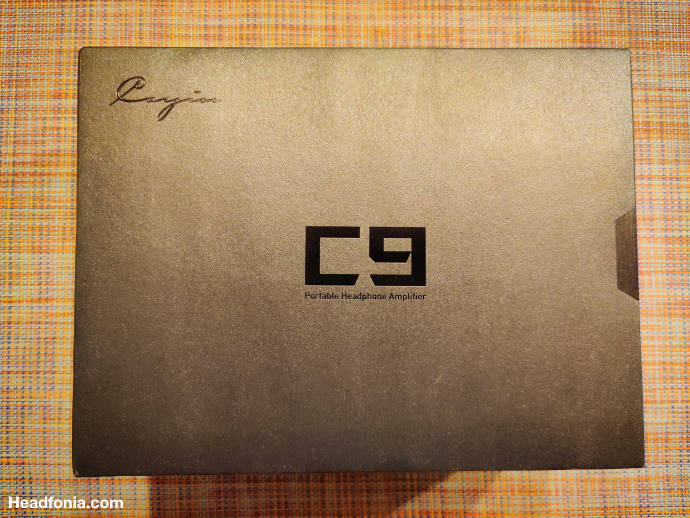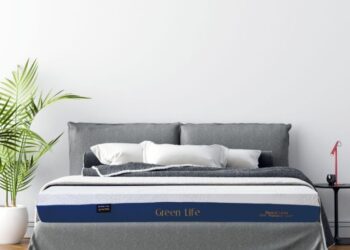Today we review the $1,999 USD Cayin C9 Transportable Amplifier.
Disclaimer: The Cayin C9 was sent to us in exchange for our honest opinion. Headfonia is in no way related to Cayin and this reviews reflects our honest opinion.
Cayin really does no longer need a introduction anymore as the Chinese brand has been covered many times on Headfonia already and because they can be found all over the web nowadays. If you’re still not sure about who Cayin is and what they stand for, check out on of our previous Cayin reviews.
If you’re still interested in finding out more about the Chinese company, then you can do si here: https://en.cayin.cn/about?c=135
The last Cayin Unit we reviewed was the N3 Pro DAP which uses miniature tubes for one of their sound outputs. Cayin also uses Korg Nutubes in some of their other units such as the TOTL DAP, the N8. We’ll be seeing more of this technology in this article.
The Cayin unit we’re reviewing today is the Cayin C9 high end amplifier, let’s dive in!
Cayin C9 – Intro
Cayin describes the new C9 as their newest reference portable amplifier but with its size (160 x 80 x 22mm) and weight (550g), it to me really is more of a transportable or small desktop amplifier.
The big advantage of not being first in publishing the C9 review is that we can now refer to the Cayin dedicated website for all of the C9’s specs. You can find out all about the Cayin C9 amplifier in detail here https://en.cayin.cn/products_info?itemid=135. If you scroll down a bit on that page, there’s also a tab which will show you all the technical specifications you can dream of.
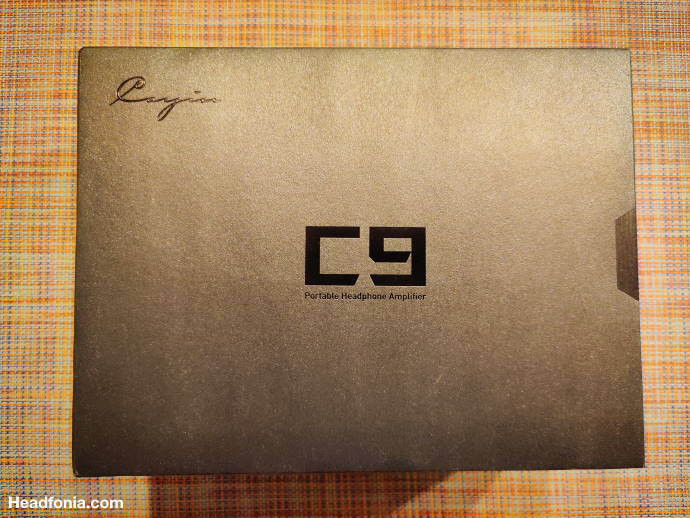
Cayin C9 – Features
“So what actually are the C9’s most important and interesting features then?”, you may ask. Well let’s check them out!
The Cayin C9 is a fully balanced and fully discrete, 4-channel headphone amplifier and it delivers up to 4,100mW (at 16Ω) or 2600mW (at 32Ω) per channel.
With the C9 you can choose between a vacuum tube and solid state output, and this both in balanced and single-end inputs. The tube circuit is designed around a pair of KORG Nutube vacuum tubes, which we already know from the Cayin N8 DAP, as stated above. You can learn more on Korg Nutubes right here: https://korgnutube.com/en/. The solid state part is built around a quad set of Toshiba 2SK209 JFET. You can find out all the specs of the board and its functional diagram on the Cayin site.
But not only does the Cayin C9 offer a double timbre, you can also switch between a pure Class A and Class AB amplification. How cool is that?! Input wise, the C9 also impresses with a dual input mode: a regular LINE input and PRE-amp input (known as pure power amplifier mode) are available. And this for single ended and balanced mode.
Input and Output-wise the Cayin C9 features a 3.5mm single ended and a 4.4mm balanced connection and the C9 will actually optimize the balanced to single ended output for you.
A high end unit like this of course features a 4-channel ALPS potentiometer with electronic volume control, what else? The Cayin C9 has a removable battery module with four user replaceable Sony 18650 rechargeable lithium batteries. That means it has clean power and on top of that, you can swap out the batteries, allowing you to use your favorite brand of batteries. Battery sound tuning anyone? According to Cayin the operation time is between 5.5h and 15h depending on how you’re using the C9. We’ll get back to this later in this article.
A really cool feature I like is how Cayin built in a custom shock-absorption silicon housing in the unit, with a spring-loaded suspension system. And I can’t remember ever having seen this before.
All-in-all it’s safe to say that the Cayin C9 amplifier really has all the high end features to be called a Reference Amplifier. We’re of to a good start!
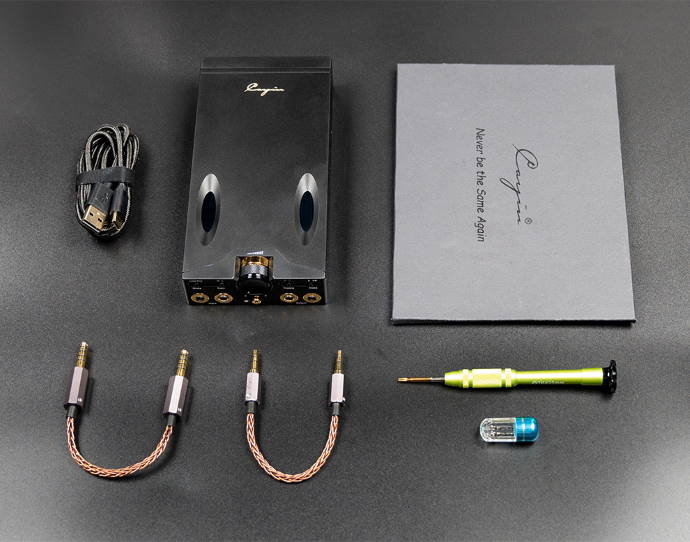
Box, Price & accessories
As you have read, the Cayin C9 is a reference amplifier in many ways already, and it logically comes at a reference high end price of $1999 USD.
The Cayin C9 comes in a nice box but for the price it’s selling for, it could have been a bit nicer. Like a wooden box in example, or the nicer boxes from AK or the HiBy R8 (even though that was overkill). At the same time, the box doesn’t really matter as you won’t be using it anymore once the unit’s unpacked. But Ok, it has to be said.
- C9 Amplifier
- C9 Battery module (mounted)
- Rear panel glass protector
- Single Ended InterConnect (CS-35C35 ($39)). 8-wire crystalized copper and 24-core 6N OFC copper
- Balanced InterConnect (CS-44C44 ($45)). 8-wire crystalized copper and 24-core 6N OFC copper
- Backup screws for the battery module / T6 screw driver
- User Manual
All-in-all the C9 package is very complete, especially the supplied interconnects. It has all it needs to directly be used with your gear, and there’s no need to order any special cables.
Design, build quality
The Cayin design team did a really great job in my opinion, and I think the C9 unit has a really nice design. Especially the part on top where the Nutubes are being shown is very sexy. The Unit just oozes quality and it’s exactly what you expect to get when buying a high end unit.
The build quality is perfect as it should be in this price class, but we already know Cayin has this part fully covered. You get top quality components, connectors (the IC are impressive!) and switches and a stunning main case on top of that. What’s not to like? (ok some might not like the gold color details, but that’s personal preference)
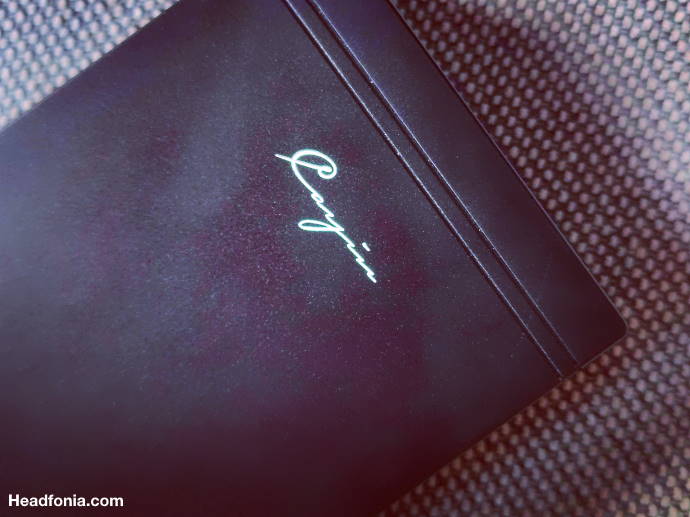
Lay-out
Lay-out wise the C9 unit is quite logic, yet interesting.
A said you on top have the part where the Nutubes are incorporated in the design, and Cayin has chosen to make both tubes visible on top. It’s very nice to see the green color of the Nutubes light up. Besides the lass panel and log, there’s no hidden switch or anything on the bottom of the unit. Maybe a set of stick-on or removable feet would have been nice.
On the right side of the amplifier there’s nothing to be seen while you on the left side you have the switch to select the pre-output as discussed above. On the back of the unit you have the USB-C connector for charging the unit, with right next to it, the 4 orange LEDs which indicate the loading status.
With this kind of simple design/lay-out so far, it means that almost everything is located on the front of the device. And the front panel indeed is where everything happens. You have a double layer of buttons and on the top one you from left to right have the line/pre selector, the gain switch, the volume dial, the solid state vs tube switch and the Class A vs Class AB switch.
On the bottom row we have the 3.5mm input, the 4.4mm input, the power button and the 4.4mm and 3.5mm headphone outputs. Phew, that’s a lot!

Usability
Even though a lot is located on the front panel, the Cayin C9 actually is very easy to use. Sure the switches are not the biggest, but I never had issues flicking them with my sausage fingers.
Using the unit in your portable or desktop setup is very easy as well. Just connect your DAP with the supplied interconnect cable or use an RCA To 3.5 or XLR to 4.4mm cable to connect the C9 amp to your source of choice.
Even though this is a portable amplifier, I have to say it’s a bit too bulky for me to take out on a walk. I have used it in my house only but it has followed me around from my office to the living room to the bedroom. Most of my use to be honest was as a desktop amplifier in my office while I was working. So I would label the C9 more as a transportable headphone amplifier, but this might of course be different to you.
As Cayin has stated, the C9 does become warmer when in use. Luckily Cayin has designed their heat management so that the C9 diverts and dissipates the heat energy effectively. This results in a constant but lower temperature when in use. So it’s warm, but not hot to the touch, and thus safe to use on the go, if you would do that.
Battery wise you’ll get around 15h of play time when using the C9 in Class AB mode with a single ended connection. Then depending on you’re using the C9, the play time will drop to 5.5h. Charging is reasonably fast, especially with a fast charger. (See playtime overview on Cayin’s website)
The article continues on the next page. Click here or use the jumps below.

